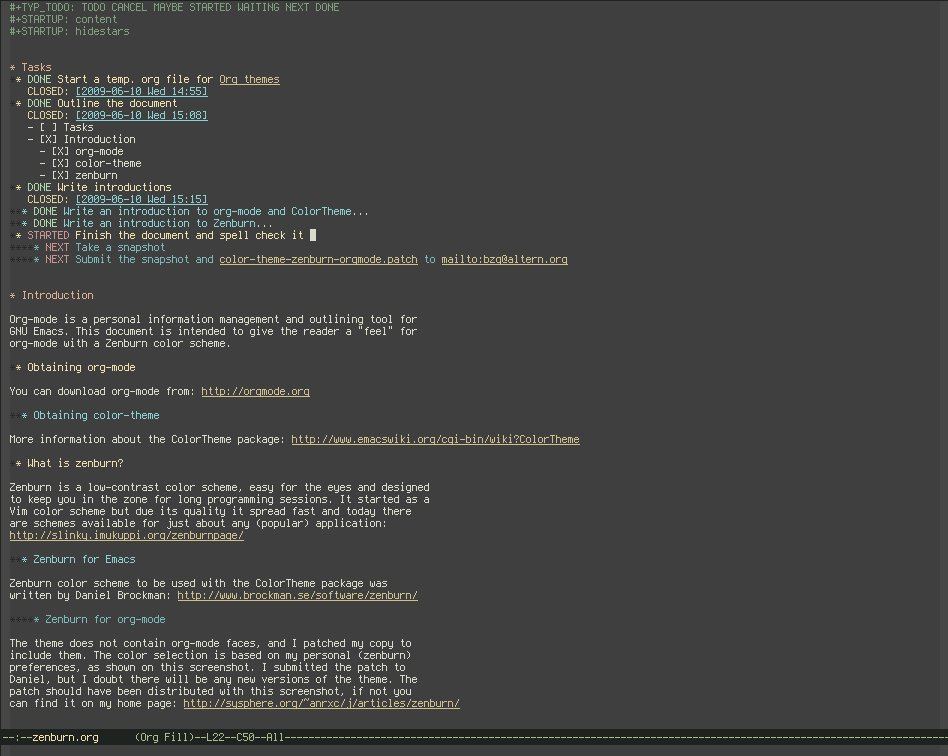Org-mode is a mode for keeping notes, maintaining ToDo lists, and doing project planning with a fast and effective plain-text system.
Org-mode develops organizational tasks around NOTES files that contain information about projects as plain text. Org-mode is implemented on top of outline-mode, which makes it possible to keep the content of large files well structured. Visibility cycling and structure editing help to work with the tree. Tables are easily created with a built-in table editor.
Org-mode supports ToDo items, deadlines, time stamps, and scheduling. It dynamically compiles entries into an agenda. Plain text URL-like links connect to websites, emails, Usenet messages, BBDB entries, and any files related to the projects. For printing and sharing of notes, an Org-mode file can be exported as a structured ASCII file, HTML, and LaTeX.
Org mode contains the Org Babel environment which allows you to work with embedded source code blocks in a file, to facilitate code evaluation, documentation, and literate programming techniques.
Org’s automatic, context-sensitive table editor with spreadsheet capabilities can be integrated into any major mode by activating the minor Orgtbl mode. Using a translation step, it can be used to maintain tables in arbitrary file types, for example in LaTeX. The structure editing and list creation capabilities can be used outside Org with the minor Orgstruct mode.
Org keeps simple things simple.
Features include:
- An outline extension with visibility cycling and structure editing.
- Full agenda and planner with deadlines and work scheduling.
- Environment in which to implement David Allen’s GTD system.
- Publishing tool to create a set of interlinked webpages.
- Environment for literate programming.
- Flexible commands to edit the structure of the document:
- Outlines, headlines, visibility cycling, motion, structure editing, sparse trees, plain lists, drawers, blocks, footnotes, and orgstruct mode.
- Fast and intuitive table editor for taking structured notes.
- Simple hypertext system, with HTML and LaTeX export.
- ToDo list editor:
- TODO keywords as workflow states.
- TODO keywords as types.
- Multiple keyword sets in one file.
- Fast access to TODO states.
- Faces for TODO keywords.
- Progress logging.
- Priorities.
- Break tasks down into subtasks.
- Checkboxes.
- Tags.
- Capture – Refile – Archive.
- Agenda views.
- Markup for rich export.
- Export:
- ASCII/Latin-1/UTF-8.
- HTML.
- LaTeX.
- PDF.
- DocBook.
- OpenDocument Text.
- Taskjuggler.
- Produce 2D and 3D graphs of information stored in org tables using Gnuplot.
Website: orgmode.org
Support: Manual, Code Repository
Developer: Carsten Dominik
License: GNU General Public License v3.0

Org-mode is written in Emacs Lisp. Learn Lisp with our recommended free books and free tutorials.
Return to Task Management Tools | Return to Notes | Return to OneNote Alternatives | Return to Terminal-Based Task Managers
| Popular series | |
|---|---|
| The largest compilation of the best free and open source software in the universe. Each article is supplied with a legendary ratings chart helping you to make informed decisions. | |
| Hundreds of in-depth reviews offering our unbiased and expert opinion on software. We offer helpful and impartial information. | |
| The Big List of Active Linux Distros is a large compilation of actively developed Linux distributions. | |
| Replace proprietary software with open source alternatives: Google, Microsoft, Apple, Adobe, IBM, Autodesk, Oracle, Atlassian, Corel, Cisco, Intuit, SAS, Progress, Salesforce, and Citrix | |
| Awesome Free Linux Games Tools showcases a series of tools that making gaming on Linux a more pleasurable experience. This is a new series. | |
| Machine Learning explores practical applications of machine learning and deep learning from a Linux perspective. We've written reviews of more than 40 self-hosted apps. All are free and open source. | |
| New to Linux? Read our Linux for Starters series. We start right at the basics and teach you everything you need to know to get started with Linux. | |
| Alternatives to popular CLI tools showcases essential tools that are modern replacements for core Linux utilities. | |
| Essential Linux system tools focuses on small, indispensable utilities, useful for system administrators as well as regular users. | |
| Linux utilities to maximise your productivity. Small, indispensable tools, useful for anyone running a Linux machine. | |
| Surveys popular streaming services from a Linux perspective: Amazon Music Unlimited, Myuzi, Spotify, Deezer, Tidal. | |
| Saving Money with Linux looks at how you can reduce your energy bills running Linux. | |
| Home computers became commonplace in the 1980s. Emulate home computers including the Commodore 64, Amiga, Atari ST, ZX81, Amstrad CPC, and ZX Spectrum. | |
| Now and Then examines how promising open source software fared over the years. It can be a bumpy ride. | |
| Linux at Home looks at a range of home activities where Linux can play its part, making the most of our time at home, keeping active and engaged. | |
| Linux Candy reveals the lighter side of Linux. Have some fun and escape from the daily drudgery. | |
| Getting Started with Docker helps you master Docker, a set of platform as a service products that delivers software in packages called containers. | |
| Best Free Android Apps. We showcase free Android apps that are definitely worth downloading. There's a strict eligibility criteria for inclusion in this series. | |
| These best free books accelerate your learning of every programming language. Learn a new language today! | |
| These free tutorials offer the perfect tonic to our free programming books series. | |
| Linux Around The World showcases usergroups that are relevant to Linux enthusiasts. Great ways to meet up with fellow enthusiasts. | |
| Stars and Stripes is an occasional series looking at the impact of Linux in the USA. | |
